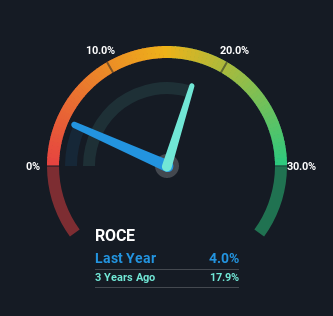i-Control Holdings' (HKG:1402) Returns On Capital Not Reflecting Well On The Business
To find a multi-bagger stock, what are the underlying trends we should look for in a business? Firstly, we'd want to identify a growing return on capital employed (ROCE) and then alongside that, an ever-increasing base of capital employed. This shows us that it's a compounding machine, able to continually reinvest its earnings back into the business and generate higher returns. Having said that, from a first glance at i-Control Holdings (HKG:1402) we aren't jumping out of our chairs at how returns are trending, but let's have a deeper look.
What is Return On Capital Employed (ROCE)?
For those who don't know, ROCE is a measure of a company's yearly pre-tax profit (its return), relative to the capital employed in the business. The formula for this calculation on i-Control Holdings is:
Return on Capital Employed = Earnings Before Interest and Tax (EBIT) ÷ (Total Assets - Current Liabilities)
0.04 = HK$6.8m ÷ (HK$226m - HK$54m) (Based on the trailing twelve months to September 2021).
Therefore, i-Control Holdings has an ROCE of 4.0%. Ultimately, that's a low return and it under-performs the IT industry average of 7.1%.
View our latest analysis for i-Control Holdings

Historical performance is a great place to start when researching a stock so above you can see the gauge for i-Control Holdings' ROCE against it's prior returns. If you're interested in investigating i-Control Holdings' past further, check out this free graph of past earnings, revenue and cash flow.
What Does the ROCE Trend For i-Control Holdings Tell Us?
On the surface, the trend of ROCE at i-Control Holdings doesn't inspire confidence. To be more specific, ROCE has fallen from 10% over the last five years. However it looks like i-Control Holdings might be reinvesting for long term growth because while capital employed has increased, the company's sales haven't changed much in the last 12 months. It's worth keeping an eye on the company's earnings from here on to see if these investments do end up contributing to the bottom line.
On a related note, i-Control Holdings has decreased its current liabilities to 24% of total assets. So we could link some of this to the decrease in ROCE. What's more, this can reduce some aspects of risk to the business because now the company's suppliers or short-term creditors are funding less of its operations. Since the business is basically funding more of its operations with it's own money, you could argue this has made the business less efficient at generating ROCE.
What We Can Learn From i-Control Holdings' ROCE
Bringing it all together, while we're somewhat encouraged by i-Control Holdings' reinvestment in its own business, we're aware that returns are shrinking. And with the stock having returned a mere 26% in the last five years to shareholders, you could argue that they're aware of these lackluster trends. As a result, if you're hunting for a multi-bagger, we think you'd have more luck elsewhere.
One more thing: We've identified 4 warning signs with i-Control Holdings (at least 1 which is potentially serious) , and understanding them would certainly be useful.
While i-Control Holdings isn't earning the highest return, check out this free list of companies that are earning high returns on equity with solid balance sheets.
Mobile Infrastructure for Defense and Disaster
The next wave in robotics isn't humanoid. Its fully autonomous towers delivering 5G, ISR, and radar in under 30 minutes, anywhere.
Get the investor briefing before the next round of contracts
Sponsored On Behalf of CiTechValuation is complex, but we're here to simplify it.
Discover if i-Control Holdings might be undervalued or overvalued with our detailed analysis, featuring fair value estimates, potential risks, dividends, insider trades, and its financial condition.
Access Free AnalysisHave feedback on this article? Concerned about the content? Get in touch with us directly. Alternatively, email editorial-team (at) simplywallst.com.
This article by Simply Wall St is general in nature. We provide commentary based on historical data and analyst forecasts only using an unbiased methodology and our articles are not intended to be financial advice. It does not constitute a recommendation to buy or sell any stock, and does not take account of your objectives, or your financial situation. We aim to bring you long-term focused analysis driven by fundamental data. Note that our analysis may not factor in the latest price-sensitive company announcements or qualitative material. Simply Wall St has no position in any stocks mentioned.
About SEHK:1402
i-Control Holdings
An investment holding company, provides video conferencing and multimedia audiovisual (VCMA) solutions in Hong Kong, the People’s Republic of China, Macau, and Singapore.
Excellent balance sheet with very low risk.
Market Insights
Weekly Picks

Early mover in a fast growing industry. Likely to experience share price volatility as they scale


A case for CA$31.80 (undiluted), aka 8,616% upside from CA$0.37 (an 86 bagger!).


Moderation and Stabilisation: HOLD: Fair Price based on a 4-year Cycle is $12.08
Recently Updated Narratives

Airbnb Stock: Platform Growth in a World of Saturation and Scrutiny

Adobe Stock: AI-Fueled ARR Growth Pushes Guidance Higher, But Cost Pressures Loom

Thomson Reuters Stock: When Legal Intelligence Becomes Mission-Critical Infrastructure
Popular Narratives


Crazy Undervalued 42 Baggers Silver Play (Active & Running Mine)


NVDA: Expanding AI Demand Will Drive Major Data Center Investments Through 2026


The AI Infrastructure Giant Grows Into Its Valuation
Trending Discussion




